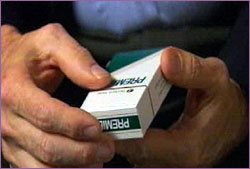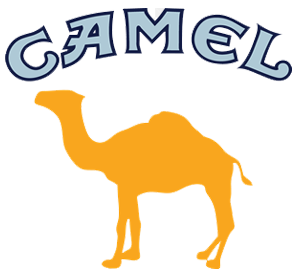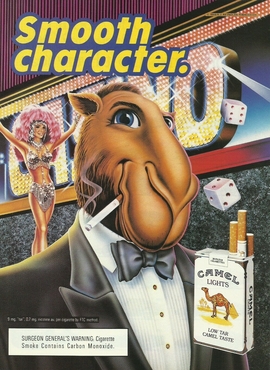Junk science is spurious or fraudulent scientific data,research,or analysis. The concept is often invoked in political and legal contexts where facts and scientific results have a great amount of weight in making a determination. It usually conveys a pejorative connotation that the research has been untowardly driven by political,ideological,financial,or otherwise unscientific motives.

Frederick Seitz was an American physicist,a pioneer of solid state physics,and climate change denier. Seitz was the 4th president of Rockefeller University from 1968 to 1978,and the 17th president of the National Academy of Sciences from 1962 to 1969. Seitz was the recipient of the National Medal of Science,NASA's Distinguished Public Service Award,and other honors.

The tobacco industry comprises those persons and companies who are engaged in the growth,preparation for sale,shipment,advertisement,and distribution of tobacco and tobacco-related products. It is a global industry;tobacco can grow in any warm,moist environment,which means it can be farmed on all continents except Antarctica.

The R. J. Reynolds Tobacco Company (RJR) is an American tobacco manufacturing company based in Winston-Salem,North Carolina. Founded by namesake R. J. Reynolds in 1875,it is the largest tobacco company in the United States. The company is a wholly owned subsidiary of Reynolds American,itself a wholly owned subsidiary of British American Tobacco.
The Heidelberg Appeal,authored by Michel Salomon,was an appeal directed against the findings of the Intergovernmental Panel on Climate Change. The Heidelberg Appeal's goal was similar to the later published Leipzig Declaration. Before the publication,Fred Singer,who has initiated several petitions like the Heidelberg Appeal,and Michel Salomon,had organized a conference in Heidelberg,which led to that document. It was published on the last day of the 1992 Rio Summit,and warned against basing environmental policies on what the authors described as "pseudoscientific arguments or false and nonrelevant data." It was initiated by the tobacco and asbestos industries,to support the climate-denying Global Climate Coalition. According to SourceWatch the appeal was "a scam perpetrated by the asbestos and tobacco industries in support of the Global Climate Coalition". Both industries had no direct reason to deny global warming,but rather wanted to promote their "sound science" agenda,which basically states that industry-funded science is good science and science contradicting those science is bad science or "junk science".

Premier was an American brand of smokeless cigarettes which was owned and manufactured by the R.J. Reynolds Tobacco Company (RJR). Premier was released in the United States in 1988. It was the first commercial heated tobacco product. However,it was difficult to use and tasted unpleasant;as a result,it was unpopular with consumers. A commercial failure,the brand was a significant financial loss for RJR and was quickly taken off the market.

Camel is an American brand of cigarettes,currently owned and manufactured by the R. J. Reynolds Tobacco Company in the United States and by Japan Tobacco outside the U.S.

Joe Camel was an advertising mascot used by the R. J. Reynolds Tobacco Company (RJR) for their cigarette brand Camel. The character was created in 1974 for a French advertising campaign,and was redesigned for the American market in 1988. He appeared in magazine advertisements,clothing,and billboards among other print media and merchandise.

R. J. Reynolds Nabisco,Inc.,doing business as RJR Nabisco,was an American conglomerate,selling tobacco and food products,headquartered in the Calyon Building in Midtown Manhattan,New York City. R. J. Reynolds Nabisco stopped operating as a single entity in 1999. Both RJR and Nabisco still exist.
Steven J. Milloy is a lawyer,lobbyist,author and former Fox News commentator. Milloy is the founder and editor of the blog junkscience.com.
Doral is an American brand of cigarettes,currently owned and manufactured by the R.J. Reynolds Tobacco Company.
Winston is an American brand of cigarettes,currently owned and manufactured by ITG Brands,subsidiary of Imperial Tobacco in the United States and by Japan Tobacco outside the U.S. The brand is named after the town where R. J. Reynolds started his business which is Winston-Salem,North Carolina. As of 2017,Winston has the seventh-highest U.S. market share of all cigarette brands,according to the Centers for Disease Control and Prevention and the Maxwell Report.
The Advancement of Sound Science Center (TASSC),formerly The Advancement of Sound Science Coalition,was an industry-funded lobby group and crisis management vehicle,and was created in 1993 by Phillip Morris and APCO in response to a 1992 United States Environmental Protection Agency (EPA) report which identified secondhand smoke as a "confirmed" human carcinogen. TASSC's stated objectives were to (1) discredit the EPA report;(2) fight anti-smoking legislation;and (3) pro-actively pass legislation favourable to the tobacco industry.

Patrick Cleveland Reynolds is an American anti-smoking activist and former actor.

APCO Worldwide is an independent global public affairs and strategic communications consultancy. With more than 1200 employees in 35 worldwide locations,it is also the fifth largest independently owned PR firm in the United States. Headquartered in Washington,D.C.,APCO was founded in 1984 by Margery Kraus,who is now the firm's Executive Chairman.
William Ralph Seagraves was an American executive. For 13 years he was the president of R. J. Reynolds Tobacco Company’s Special Events Operations. His help in introducing Winston cigarette advertising into NASCAR and National Hot Rod Association (NHRA) lead him to be inducted in the International Motorsports Hall of Fame in 2008. He is the 2021 recipient of the NASCAR Hall of Fame’s Landmark Award.

Reynolds Securities was a publicly traded brokerage firm. Founded in 1931 by Richard S. Reynolds,Jr.,the firm merged with Dean Witter &Co. to form Dean Witter Reynolds Organization Inc. in 1978,which was then the biggest merger in the history of Wall Street.

Vuse is an American brand of electronic cigarettes introduced in 2013. They are produced and marketed by the Reynolds American tobacco company and globally by its parent company,British American Tobacco (BAT). Products were previously also marketed internationally as Vype,originally launched by BAT before its acquisition of Reynolds American,until 2021.
The composition of the emissions generated from heated tobacco products are generally lower than that found in cigarette smoke. This is due to the comparatively low temperatures,the filter systems,and physical design. The composition of what is produced is complex. The main toxicants found in the emissions of cigarette smoke are also found in the emissions of these products in varying concentrations. The aerosol generated contains levels of nicotine and cancer-causing chemicals that are comparable to regular cigarettes. The emissions contained 84% of the nicotine found in regular cigarettes.

The tobacco industry playbook,tobacco strategy or simply disinformation playbook describes a strategy used by the tobacco industry in the 1950s to protect revenues in the face of mounting evidence of links between tobacco smoke and serious illnesses,primarily cancer. Such tactics were used even earlier,beginning in the 1920s,by the oil industry to support the use of Tetraethyllead in gasoline. They continue to be used by other industries,notably the fossil fuel industry,even using the same PR firms and researchers.













